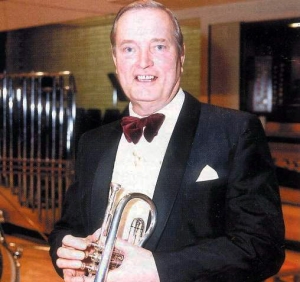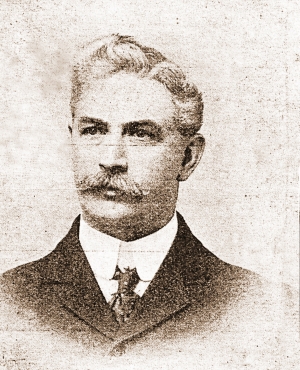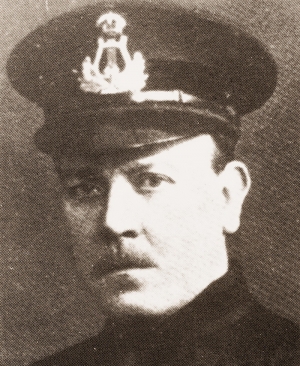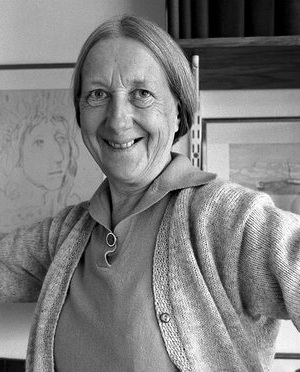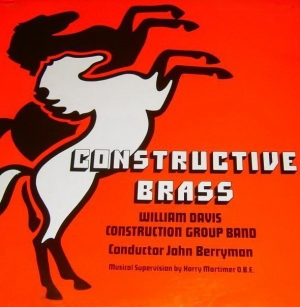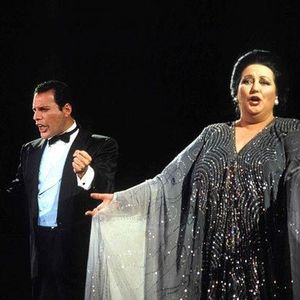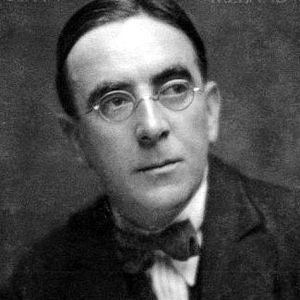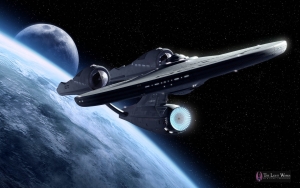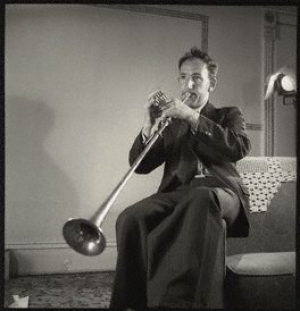
Chris Helme
Derek M. Garside taken in the 1990s as a member of the Kings of Brass. He is featured on this week's show playing '...I Hear You Calling Me...'
Arguably the finest cornet player of his generation.
............Some listeners may have noticed my programme has disappeared from Facebook. After a poor experience with Facebook I have removed it and my own named page from Facebook...
My new website which will feature Sunday Bandstand and lots more will be ready soon.
Over the next few weeks we will be featuring some of the music from one of the giants of the brass band world, William Rimmer, who died 80 years ago. Born in Southport in 1862 into a musical family. His father a bandmaster at the Lancashire Volunteer Rifles encouraged William and his brother Robert in their musical studies.
Aged 15 he joined Southport Rifle band as a side-drummer, then moved on to the cornet, eventually becoming the band's principal cornet. As a young man he became one of the finest cornet players in the country. His skill on the instrument became well known, and he was engaged as a soloist by many of the best bands of the day. He eventually gave up playing to concentrate on training and conducting bands, and at the height of his fame conducted every winning band at both the Crystal Palace and Belle Vue competitions between 1905 and 1909
In 1909 he retired to concentrate on his composition and arranging. He died on Southport on the 9 February 1936, aged 74
James Oliver b:1872 - d: 1950 will be forever linked to the St Hilda Colliery Band where he was the conductor for 22 years. He was born in Haswell in County Durham, England. Early tuition was by his father, a noted local conductor. His first band as a 'learner' in 1895 was the Murton Colliery Band.
Conducting success came with the Felling Colliery Band, in 1910 he was appointed the bandmaster of St Hilda's. It was his determination that was to develop this band from a second section band to the highest level.
He took the St Hilda band to five top section championship prizes at the Crystal Palace along with many other awards. Another high point was the band's command performance given to the King and Queen and other members of the royal family.
During his conducting career he was guest conductor and professional conductor to other bands at many contests. He was also a respected adjudicator.
On this week's show he is conducting St Hilda's on a 1923 track.
Imogen Holst (1907-1984), the daughter of Gustav Holst. In 1966 she conducted the BMC (Oxford) Band in what was the first full length recording of her father's 'A Moorside Suite' since an abridged version was recorded in September 1928 by Black Dyke Mills Band on three sides of two 78 rpm recordings.
She was so musically enthused by her father's composition for the 1928 National Finals she was inspired to write a piece for a full brass band titled 'The Unfortunate Traveller'. In 1930 she submitted it to the Royal College of Music and before she left college it was performed in a version written for a string orchestra.
It was almost forgotten until her father was invited to Carlisle to take part in a concert. He and Imogen travelled to Carlisle where she was given the opportunity of conducting the Carlisle St. Stephen Band playing her new composition. Following that performance it was not publicly heard again until 2011 when Zone One Brass played it in Ulverston.
Enjoy
A number of bands in the Leicestershire area in the 1970s boasted long histories which in some cases linked back to the working class movements of the nineteenth century, as was apparent with some of their names such as Wigston Temperance Band.
Many of the bands were village bands with local players such as Hathern, Ratby, Croft and Enderby.
Others such as City of Leicester Club and Institute Band, were supported by the working men's clubs and in the county Desford, Snibston and Whitwick with many having their roots in the old coal industry.
The Snibston Colliery Band had started life sometime before 1863 and was renamed Ebenezer Chapel Band and then the Coalville Coronation Band. In 1924 it was renamed as the Snibston Colliery Silver Prize Band. It was during the 1970s that through sponsorship from the William Davis Construction Company it adopted that company title as its new name.
On this week's show is a track from this band under the baton of John Berryman..
Freddie Mercury and Montserrat Caballé had success with the song Barcelona in 1988. After Barcelona was selected to host the 1992 Summer Olympics, He was approached to write a song as a theme for the forthcoming games. The idea was to create a duet with Montserrat Caballé, as she is from the city.
He had been a long-standing admirer of her and she in turn grew to respect his talents very highly. They decided to work on an album together, with Freddie Mercury and Mike Moran taking the creative lead as songwriters. They made and sent her tapes of the music with Mercury singing in falsetto as a guide vocal for her parts. As they rarely had an opening in their schedule to meet, her parts were recorded at another location.
On this week's show is the brass band arrangement of Barcelona played by Grimethorpe Colliery Band in 1993.....Enjoy
PLEASE NOTE that owing to technical problems beyond our control this is a repeated show from 11 September 2016.
John Nicholson Ireland (13 August 1879 – 12 June 1962) was an English composer born in Bowden near Altrincham Cheshire and teacher of classical music. The majority of his prolific output consists of piano miniatures and songs with piano.
In 1932 he wrote the national brass band championship final test piece A Downland Suite (winner Foden's Motor Works MD: Fred Mortimer) and then the 1934 test piece Comedy Overture (winner Foden's Motor Works MD: Fred Mortimer).
He retired in 1953, settling in the small hamlet of Rock in Sussex, where he lived in a converted windmill for the rest of his life. He died of heart failure aged 82 at Rock Mill in Washington, Sussex, and is buried at St. Mary the Virgin in Shipley, near his home. His epitaph reads "Many waters cannot quench love" and "One of God's noblest works lies here."
A performance of Comedy Overture is on this week's programme played by Grimethorpe Colliery Band MD: Elgar Howarth in 2003 - enjoy.
Star Trek is the American science fiction entertainment franchise created by Gene Roddenberry. The first series, referred to as The Original Series, debuted in September 1966 and ran for three seasons. It followed the galactic adventures of James T. Kirk and the crew of the Starship Enterprise, an exploration vessel of a 23rd-century interstellar "United Federation of Planets."
The "Theme from Star Trek" (originally scored under the title "Where No Man Has Gone Before") is an instrumental musical piece by Alexander Courage for Star Trek,.
The music was played over both the opening and closing credits of the original series. The opening credits begin with the now-famous "where no man has gone before" monologue recited by series star William Shatner, accompanied by an opening fanfare.
On this week's show we close with the main theme to the Star Trek 'The Voyage Home' movie theme. The original music was written by Leonard Rosenmann and arranged for brass bands by Darrol Barry.
Enjoy.
Willie Lang was born in County Mayo in the Republic of Ireland in 1919. After moving to the Yorkshire he joined the Norland Band on cornet and was soon seen as something of a child prodigy. At the age of 16 he became assistant principal cornet at Black Dyke under Harold Jackson.
During the War he was became a tank commander, serving with distinction in North Africa and Italy. He returned to Black Dyke on demobilization, only being giving the corner chair after an audition, and in his second term became Champion Cornet Player of Great Britain in 1947 as well as leading the band to three National triumphs.
A further period away from the band he was in such demand as a player that it was soon apparent that he would move on to the professional ranks. 1953 he joined the Halle Orchestra on third trumpet, by 1961 his reputation was such that he joined the London Symphony Orchestra as Principal Trumpet. He retired from the orchestra after 27 years service, a truly great player.
Enjoy
Leroy Anderson was one of America's most popular composers of light orchestral music. A talented conductor and arranger. He had a particular knack for creating humorous sound effects with standard orchestral instruments and percussion.
Born (29.6.1908 d: 18.5.1975) in Massachusetts. His mother played the organ in church, and gave her 11 yrs old son lessons. He studied piano at the New England Conservatory of Music.
University studies included playing both trombone and double bass in the orchestra; he also sang in the glee club and joined the marching band as drum major & arranger. He stayed around to earn his master's degree, then took a teaching post. He also directed the marching band, performed as a freelance organist and bassist.
In 1935, he became a full-time freelancer. He later joined the Boston Pops Orchestra to arrange & conduct his song arrangements. MD Arthur Fiedler liked his work, a full-time position soon followed as the Boston Pops' arranger & orchestrator.
Talks Available
All the presentations are timed to last up to an hour except where shown - questions are gladly taken after the presentation. All have been presented to male, female and mixed audiences of varying age groups.
-
A Postcard from the Past
The Sunny Vale Pleasure Gardens, Halifax - Yorkshire’s Alton Towers of the…
-
All in a Days Work
Reminiscences from 30 years in the Police Service – (humorous lecture presentation)…
-
Legends from the world of Brass Bands
(Info-tainment – digital slides & music) – 1 hour presentation.
-
A Week in May
A story based on the Murder of Lord Frederick Cavendish (of the…
- Memories of Christmas Past
-
The Road to Publication
In 1979 I was asked to assist in presenting a series of…
- Holiday Memories from the Past
-
How we used to live
We have all seen and experienced changes in our lives. Bring back…
-
Other Folks Rubbish (Not suited to a Zoom presentation)
With a local history theme… – (thought provoking humorous lecture presentation) –…
- So you want to be a Pirate ? - The life of a Pirate was not all that it seemed
- Superstitions, New Year Resolutions and the Origins of St Valentine's Day
- Brighouse at Work
-
Sorry but I am not able to accept any more face to face talk bookings at the present time ONLY ZOOM TALKS


